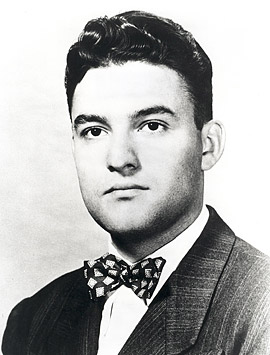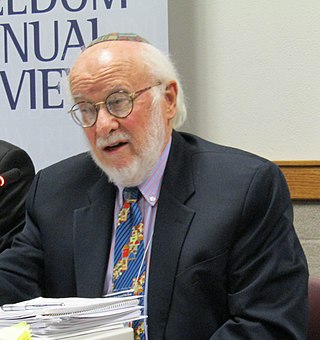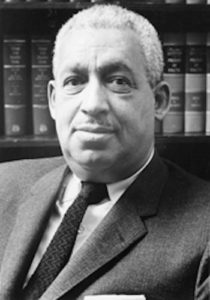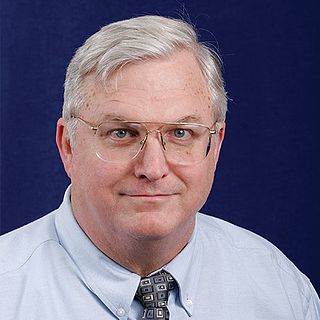
In law, the bar is the legal profession as an institution. The term is a metonym for the line that separates the parts of a courtroom reserved for spectators and those reserved for participants in a trial such as lawyers.
Charles Hamilton Houston was a prominent African-American lawyer, Dean of Howard University Law School, and NAACP first special counsel, or Litigation Director. A graduate of Amherst College and Harvard Law School, Houston played a significant role in dismantling Jim Crow laws, especially attacking segregation in schools and racial housing covenants. He earned the title "The Man Who Killed Jim Crow".
Robert S. BennettIII is an American attorney and senior counsel to Bennett LoCicero & Liu LLP. He is best known for representing President Bill Clinton during the Clinton–Lewinsky scandal.

Jack Bertrand Weinstein was a United States district judge of the United States District Court for the Eastern District of New York. Until his entry into inactive senior status on February 10, 2020, he maintained a full docket of cases.

Jack Greenberg was an American attorney and legal scholar. He was the Director-Counsel of the NAACP Legal Defense Fund from 1961 to 1984, succeeding Thurgood Marshall.

Walter Estes Dellinger III was an American attorney and legal scholar who served as the Douglas B. Maggs Professor of Law at Duke University School of Law. He also led the appellate practice at O'Melveny & Myers in Washington, D.C. and the Harvard Law School's Supreme Court and Appellate Litigation Clinic. He served as Acting United States Solicitor General under the administration of President Bill Clinton, from 1996 to 1997.

Seth Paul Waxman is an American lawyer who served as the 41st Solicitor General of the United States from 1997 to 2001. He then returned to private legal practice, and serves as the co-chairman of the appellate and Supreme Court litigation practice group at the law firm Wilmer Cutler Pickering Hale and Dorr. He has appeared before the Supreme Court more than 80 times.

Herbert H. Haft was an American businessman who was famous first for the development of discount stores in the drug store, bookstore, and auto part businesses in Washington, D.C., and later as a corporate raider.
Gary P. Naftalis is an American trial lawyer, and head of the litigation department and co-chair of Kramer Levin Naftalis & Frankel LLP, a New York City law firm.

Nathan Lewin is an American attorney who has argued many cases before the Supreme Court of the United States.
Matthew James Perry Jr. was an attorney and in 1979 appointed as the first African-American United States district judge in South Carolina, serving on the United States District Court for the District of South Carolina. In 1976 he had been the first African-American attorney from the Deep South to be appointed to the federal judiciary, which he served on the United States Court of Military Appeals. Perry established his career with civil rights litigation, defending Gloria Blackwell in Orangeburg, South Carolina, in her 1962 suit against her arrest for sitting in the whites-only area of the regional hospital while waiting for emergency treatment for her daughter. Other landmark cases included achieving the integration of Clemson University and reapportionment of the state legislature.
Leonard Burke Sand was an American judge who served as a United States district judge of the United States District Court for the Southern District of New York.
Eugene Perelshteyn is an American chess player and writer. He earned the FIDE Master title in 1997, the International Master title in 2001, and the Grandmaster title in 2006.

William Robert Ming Jr. was an American lawyer, attorney with the National Association for the Advancement of Colored People (NAACP) and law professor at University of Chicago Law School and Howard University School of Law. He presided over the Freeman Field mutiny court-martials involving the Tuskegee Airmen. He is best remembered for being a member of the Brown v. Board of Education litigation team and for working on a number of the important cases leading to Brown, the decision in which the United States Supreme Court ruled de jure racial segregation a violation of the Equal Protection Clause of the Fourteenth Amendment of the United States Constitution.
David Nimmer is an American lawyer, law professor, renowned as an expert in United States copyright law. He received an A.B. with distinction and honors in 1977 from Stanford University and his J.D. in 1980 from Yale Law School, where he served as editor of the Yale Law Journal. David Nimmer is of counsel to Irell & Manella LLP in Los Angeles, California. He also serves as a Professor from Practice at University of California, Los Angeles Law School and Distinguished Scholar at the Berkeley Center for Law and Technology. In 2000, he was elected to the American Law Institute. He has served as a guest professor at the University of Haifa, Yeshiva University, the University of Miami, and Syracuse University.
Edgar Snyder is a Pittsburgh-area personal injury lawyer. One of the first attorneys in the area to advertise extensively on television, he became recognizable from his marketing campaign, which began in the mid 1980s. In 2009, the Pittsburgh Post-Gazette called him "Pittsburgh's best-known personal injury attorney".
Sybil Shainwald is an American attorney specializing in women's health law and an activist for women's health reform. She has represented thousands of women and their children in individual and class action suits against manufacturers of harmful drugs, devices, and procedures. Shainwald is former chair of the National Women's Health Network, co-founder of Health Action International and Trial Lawyers for Public Justice.

George Robert "Bob" Dekle Sr. is an American lawyer who was an Assistant State Attorney in Florida's Third Judicial Circuit from 1975 through 2005. During this time, he served as lead prosecuting attorney in the 1980 Orlando murder trial of serial killer Ted Bundy, which ultimately delivered the death penalty that was carried out in 1989. Dekle's book on the case, The Last Murder: The Investigation, Prosecution, and Execution of Ted Bundy, was published in 2011.

Alex Stein is an Israeli jurist who currently serves as a Justice on the Supreme Court of Israel and a former law professor.
Jennifer Rodgers is an American attorney and legal analyst at CNN.











